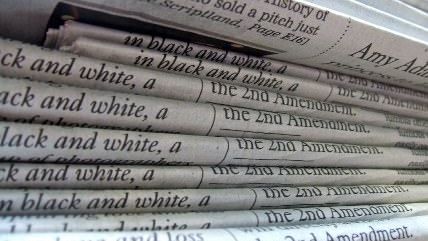Australia's Press Regulators Look To Enforce Ideological Conformity


As noted at Reason 24/7, the Australian Press Council, an industry-established regulatory body created to head off government interference with the media, takes exception to what it sees as the conservative slant of Rupert Murdoch's newspapers in that country. Specifically, the council chimed in with a wrist-slap to "editors" clearly aimed at Murdoch's properties just days after the government-owned Australian Broadcasting Corporation complained that his Daily Telegraph was mean-spirited in covering allegations that Labor Prime Minister Kevin Rudd is a dick (not a secret, down under). That's right, chimed in British Labour politician Tom Watson, who has taken his anti-Murdoch crusade to Australia. "That's an abuse of their position if they're going to pump out propaganda." It's all a very interesting peek at why "press regulation" is a such lousy idea that inevitably ends up as a tool for enforcing conformity — of opinion in particular.
The government broadcaster's talking head, Paul Barry, continued his dissection of the Telegraph:
So let's look at the Telegraph in a little more detail, because there is absolutely no doubt about its bias in this election.
In the first week of the campaign we tallied the Tele's coverage and found that exactly half its 80 political stories were slanted against Labor, while none were against the Coalition.
In the last two weeks the result is even clearer.
Out of 107 stories:
59 in our opinion are quite clearly Anti Labor. While just four are anti the Coalition. Only three of the Tele's stories are pro Labor, while 19 are pro the Coalition. And the rest are neutral.
Looking through the pages it's also clear that it's not policies or performance that Murdoch's paper is attacking. It's Rudd himself, whom they paint as a psychopath, a narcissist, a bore and a cheat, and a great deal more.
Australian television journalism, it should be noted, rises almost to the professional standards of the average high school A-V club.
Tom Watson is not only a Labour parliamentarian, but the author of Dial M for Murdoch: News Corporation and the Corruption of Britain. For him, taking down the conservative newspaper publisher is a passion and a business. Said he to the Australian Financial Review:
"And they say, 'we're a free press, we can say whatever we like'. Yes you can, but you can't use it for propaganda."
Well, that's an interesting take on the meaning of "free press."
All of this elicited a letter from the above mentioned Australian Press Council, a body that previously investigated the Daily Telegraph for referring to a government program as "bungled", "botched" and "much-maligned" and The Australian for running a cartoon portraying the prime minister in a Soviet -realist style. Cautioned the letter:
[T]he Council believes that it is essential that a clear distinction be drawn between reporting the facts and stating opinion. A paper's editorial viewpoints and its advocacy of them must be kept separate from its news columns.
That's one philosophy of journalism, for certain, and it is likely that Murdoch's newspapers run afoul of it by taking very clearly right-of-center political positions on the issues. But that's not a unique situation in Australia. In 1999, Michael Warby of the free-market Institute for Public Affairs wrote of his experience with the national broadcaster:
Let me start with a vignette from personal experience. I have no problem with same-sex marriage or adoption, believe that narcotics should be legalised because adults own their own bodies, was three times a marshal in the Sydney Gay and Lesbian Mardi Gras and have been a union workplace delegate. This should clearly class me as a standard-bearer for the counter-culture.
But the ABC is cleverer than that: they can see right through me. I am, in fact, an ultra-conservative. Or at least, that is what they told Australia.
The second last occasion on which I appeared on ABC Radio News I was introduced as a spokesperson for the 'ultra-conservative' H R Nicholls Society. The H R Nicholls Society is a labour market reform body which advocates the replacement of our 94-year-old arbitration system. It is reformist certainly, radical maybe. Yet, in ABC-speak, it is 'ultra-conservative'.
Now, when was the last time any of us heard an ABC announcer to refer to the 'radical' Greenpeace, the 'left-wing' Australia Institute or the 'ultra-left' or 'ultra-radical' anything? Only those deemed to be on the right of centre are automatically given ideological labels by ABC presenters. I doubt that anyone in the ABC will see any problem in this.
This personal tale also would seem to run afoul of the Press Council's take on the proper practice of journalism. But aside from the fact that Australian taxpayers are soaked for the cost of the ABC, there's nothing necessarily wrong with the broadcaster having a left-wing take, or the Telegraph a right-wing take, on the news. Given our inherent biases and tendency to flock with like-minded individuals who share our good sense, it's probably impossible to avoid such bias, since we end up soaking in it and taking it for the norm.
Which means that a press regulator that attempts to eliminate political bias from the news media will inevitably end up cracking down on views that contrast with those of whoever dominates the regulatory body. Those "different" views will be the ones that stand out as "bias."
As mentioned, the Australian Press Council is an industry body, with no legal powers. But Australia's Finkelstein Inquiry threatens government regulation of the press. That proposal hasn't been enacted yet, but the country is hovering on the brink of legally enforceable crackdowns on "bias." Britain is also close to enacting government controls over the press.
Press regulation with legal teeth will certainly do its best to root out media bias — as perceived by those in power.


Show Comments (97)